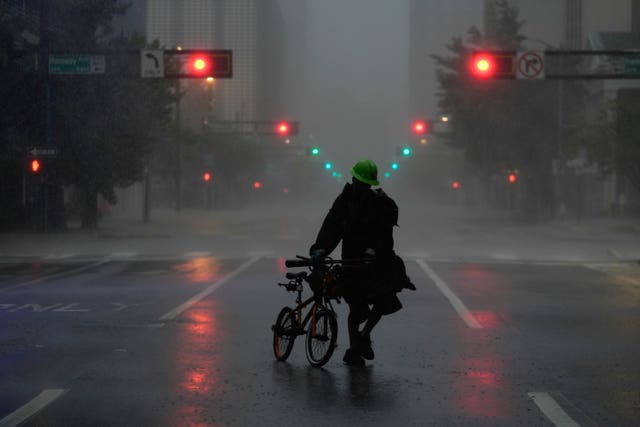
Ben Kentish 4pm - 7pm
10 October 2024, 05:34

The cyclone had maximum sustained winds of 120mph (205kph) as it roared ashore 8.30pm local time.
Hurricane Milton crashed into Florida as a Category 3 storm on Wednesday, pounding the coast with ferocious winds of more than 100mph (160kph) and producing a series of tornadoes around the state.
The cyclone had maximum sustained winds of 120mph (205kph) as it roared ashore 8.30pm local time near Siesta Key, the Miami-based National Hurricane Centre said.
Siesta Key is a prosperous strip of white-sand beaches that is home to 5,500 people about 70 miles (112 kilometres) south of Tampa Bay, which avoided a direct hit.
The Tampa Bay area has not taken a direct hit from a major hurricane in more than a century, but the storm was still bringing a potentially deadly storm surge to much of Florida’s Gulf Coast, including densely populated areas such as Tampa, St. Petersburg, Sarasota and Fort Myers.
Heavy rains were also likely to cause flooding inland along rivers and lakes as Milton traverses the Florida peninsula as a hurricane, eventually to emerge in the Atlantic Ocean on Thursday.
Flash Flood Emergency continues for Tampa FL, Saint Petersburg FL and Clearwater FL until 2:30 AM EDT pic.twitter.com/w2KDHMQKpp
— NWS Tampa Bay (@NWSTampaBay) October 10, 2024
More than 2 million homes and businesses were without power on Wednesday night in Florida, according to poweroutage.us, which tracks utility reports. The highest number of outages were in Sarasota County and neighbouring Manatee County.
About 125 homes were destroyed before the hurricane even made landfall, many of them mobile homes in communities for senior citizens, Kevin Guthrie, the director of the Florida Division of Emergency Management, said.
Milton slammed into a Florida region still reeling from Hurricane Helene, which caused heavy damage to beach communities with storm surge and killed a dozen people in seaside Pinellas County alone.
Earlier, officials issued dire warnings to flee or face grim odds of survival.
“This is it, folks,” said Cathie Perkins, emergency management director in Pinellas County, which sits on the peninsula that forms Tampa Bay.
“Those of you who were punched during Hurricane Helene, this is going to be a knockout. You need to get out, and you need to get out now.”
By late afternoon, some officials said the time had passed for such efforts, suggesting that people who stayed behind hunker down instead. By the evening, some counties announced they had suspended emergency services.
Multiple tornadoes spawned by the hurricane tore across Florida, the twisters acting as a dangerous harbingers of Milton’s approach. Videos posted to social media sites showed large funnel clouds over neighbourhoods in Palm Beach County and elsewhere in the state.

Milton was expected to remain a hurricane after hitting land and progressing across the state, including the heavily populated Orlando area, through Thursday.
The storm threatened communities still reeling two weeks after Hurricane Helene flooded streets and homes in western Florida and left at least 230 people dead across the South.
In many places along the coast, municipalities raced to collect and dispose of debris before Milton’s winds and storm surge could toss it around and compound any damage.
With the storm weaker but growing in size, the surge was projected to reach as high as nine feet (2.7 metres) in Tampa.
Jackie Curnick said she wrestled with her decision to stay and hunker down at home in Sarasota, just north of where the storm made landfall. But with a two-year-old son and a baby girl due on October 29, Ms Curnick and her husband thought it was for the best.
Ms Curnick said they started packing on Monday to evacuate, but they could not find any available hotel rooms, and the few they came by were too expensive.
She said there were too many unanswered questions if they got in the car and left: Where to sleep, if they would be able to fill up their gas tank, and if they could even find a safe route out of the state.
“The thing is it’s so difficult to evacuate in a peninsula,” she said.
“In most other states, you can go in any direction to get out. In Florida there are only so many roads that take you north or south.”
The famous Sunshine Skyway Bridge, which spans the mouth of Tampa Bay, closed around midday. Other major bridges also closed.

At a news conference in Tallahassee, Governor Ron DeSantis described deployment of a wide range of resources, including 9,000 National Guard members from Florida and other states; more than 50,000 utility workers from as far as California; and highway patrol cars with sirens to escort gasoline tankers to replenish supplies so people could fill up their tanks before evacuating.
“Unfortunately, there will be fatalities. I don’t think there’s any way around that,” Mr DeSantis said.
Heavy rain and tornadoes lashed parts of southern Florida starting Wednesday morning, with conditions deteriorating throughout the day.
Six to 12 inches (15 to 31 centimetres) of rain, with up to 18 inches (46 centimetres) in some places, was expected well inland, bringing the risk of catastrophic flooding.
One twister touched down on Wednesday morning in the lightly populated Everglades and crossed Interstate 75. Another apparent tornado touched down in Fort Myers, snapping tree limbs and tearing a gas station’s canopy to shreds.
Authorities have issued mandatory evacuation orders across 15 Florida counties with a total population of about 7.2 million people.
Officials warned that anyone staying behind must fend for themselves, because first responders were not expected to risk their lives attempting rescues at the height of the storm.
St. Petersburg mayor Ken Welch told residents to expect long power outages and the possible shutdown of the sewer system.
By early afternoon, airlines had cancelled about 1,900 flights. SeaWorld was closed all day on Wednesday, and Walt Disney World and Universal Orlando shut down in the afternoon.